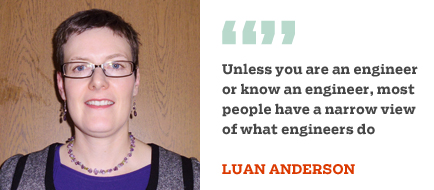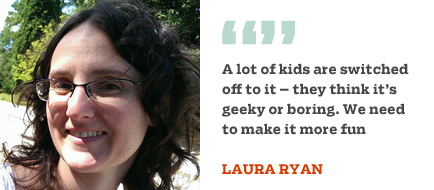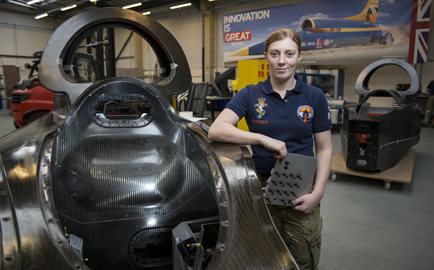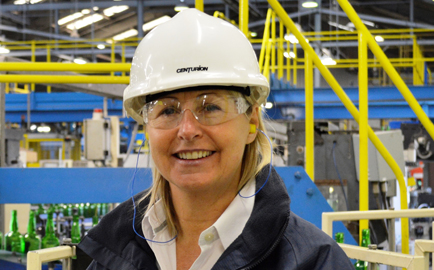There’s no getting away from the fact that women working in engineering are in the minority. Being surrounded by men all day is not many women’s idea of a dream job, so how does this affect them and what do they think can be done to ensure that the next generation of female engineers doesn’t have to go through the same kind of experience?
Esther Hills, BP engineering manager – product performance
“Out of my team of 18 engineers I have one woman, but there are more women engineers on site here than I have experienced before. I don’t feel that we are outnumbered because a lot of the other teams we work with have a high percentage of females, so when we have meetings there is a good mix in the room.
“Early on in my career I did tend to be the only female in meetings. It takes a bit of getting used to. Your experience really depends on the team and how supportive they are. That is one thing that has changed a lot over the past 20 years.
“The shortage of female engineers has been caused by a misconception. They don’t understand all of the different variety of roles in engineering.
“They tend to think that engineering is one thing, like a vehicle technician, but actually it is such a broad sector, with different technical areas and work that you can do. For example in the oil and gas sector, they think it means you have to work on a rig and they think how can I manage that with a family. But there are a lot of engineering roles which are office-based.
“Numbers of women in the profession have grown a lot over my career, but that still needs to improve. I don’t see enough women applying for roles when I am recruiting. I still only get one in 10 CVs from women.
“I would just like to see more women picking engineering as a career. The key to that is the education at school level so they know what the options are.
“I’ve not really come across sexism or discrimination. In any forward-thinking business there is a culture of mutual respect. I work in a very open environment. There is a lot of sharing of ideas. You feel like you can speak up and you will be supported.
“I would advise women to get involved with women’s engineering networks and meet your colleagues because there’s a lot of advice and support out there.”

Luan Anderson, Network Rail infrastructure project manager
“There are a lot of females who don’t even attempt to go into engineering and it would be really great if they did – there are a lot of capable women out there. I have heard people say they weren’t encouraged to do engineering, perhaps also they don’t know what it is. If you don’t have a family member or a friend that works as an engineer then you might not know the full scope of the different engineering subjects you could get involved in and what that might mean day-to-day.
“It seems to me the shortage is getting worse. We need more engineers in this country. If they understood better what engineering was, that would improve. We need to get in and encourage people at school level, before they even start choosing their subjects, particularly people who are good at maths and science. Some companies have great projects with schools, but there’s a problem with coverage. With more government support, more could be done.
“My current employer is trying to put a talent scheme into place. When I worked in consulting, flexible hours were built into the daily norm, and that did not degrade the quality of work produced. I think that is alien to the industry as a whole.
“I would like to see more younger women coming into the industry that are right for the industry – not just because we need the numbers.”

Laura Ryan, Sellafield senior engineer
“There are not a lot of women here, but I don’t feel outnumbered because I went into the industry knowing I would be in the minority. I have always been in the minority – when I did my degree I was the only female on the course, and when I did A-level physics there were only five girls. If it’s a career you choose, you have to realise there isn’t going to be 50:50. Making them prepared for this will help.
“Engineering was never promoted to me as a career. I can remember distinctly my careers adviser questioning me about why I wanted to be an engineer because I was a ‘bright girl’. It was clear he didn’t know what an engineer was. I was fortunate because my dad was an engineer so I got quite a good idea of the work I could do. Unless you are an engineer or know an engineer, most people have a narrow view of what engineers do.
“Primary schools are very keen to sell themselves on sport, arts and music, but there isn’t a huge amount of focus on the sciences, engineering and technology. A lot of students don’t see it as something to do, and a lot of kids are switched off to it – they think it’s geeky or boring. So I think we need to promote it at a younger age to raise the profile and make it more fun.
“There is a general shortage of engineers. Whether they are male or female, I am not too concerned about – I just want to see good engineers coming through in the quantities we need. There are a lot of engineers coming up to retirement age and they don’t have anyone to pass their knowledge on to.
“I haven’t experienced sexism in the industry. That’s not to say I haven’t had snipes, but that’s a part of ongoing working relationships. You can’t be very fragile, you have to join in with the banter. It’s not meant to be offensive.
“In terms of the additional work commitment to go higher up the ladder, I am not prepared to sacrifice my home life any further. However, that might change when my kids have left home.”

Avionics Corporal Chloe Rhodes of the Royal Electrical and Mechanical Engineers
“I went straight from school into the army – I knew I wanted to join the army, not that I wanted to go into engineering. The careers office gave us a list of possible roles and when I saw I could work with and maintain helicopters I thought that would be a really interesting job. I could learn a lot and also get a trade out of it.
“During my time I have seen a lot more women joining my trade – aviation engineering. I do exactly the same job as my male counterparts. If I do the job up to the same standard then there are no issues. We are not treated differently which is great.
“As a Stem ambassador I go into schools and discuss projects. Children and teachers are becoming more aware of what engineering is – they really appreciate us visiting them because they get more in-depth information about engineering and science and technology subjects in general.
“I hope to experience as many engineering fields as I can and keep learning from those around me because there are so many experienced people around.
“My advice would be to look at what sort of engineer you want to be, make sure you are going to get what you want out of it, and just keep at it.”

Julie Watson, Ardagh Glass plant director
“Historically, this is a male-dominated environment because of the physical aspects of the job and what we have to do around the plant. It is starting to change, we are starting to see women applying for jobs, but it is very slow.
“I stumbled into the industry – I wanted to be a clothes designer! I found it fascinating when you look at the process of making the containers, so I decided to stay and learn the process.
“My friends and family didn’t really understand it until I got further up the ladder. When they understood the magnitude of the plant, they couldn’t believe it. When I started, it was out of the norm for a woman to go into a manufacturing job.
“The perception of engineers is that it’s quite a masculine role, and we’ve all been socialised to accept that. It’s deeply entrenched. The only way it’s going to change is by educating children.
“We have a low turnover of staff – it’s quite an infectious industry – once they come it is very rare that they leave. I have only ever worked at one plant.
“I’d like to see more women in the industry. That is why I am trying to support a British Glass initiative on this.
“Women have something to offer, we are multi-taskers, and have a lot to offer emotionally and mentally.
“I’d like to see more women having a go and believing in themselves that they can do what males can do within the industry – because we can.”